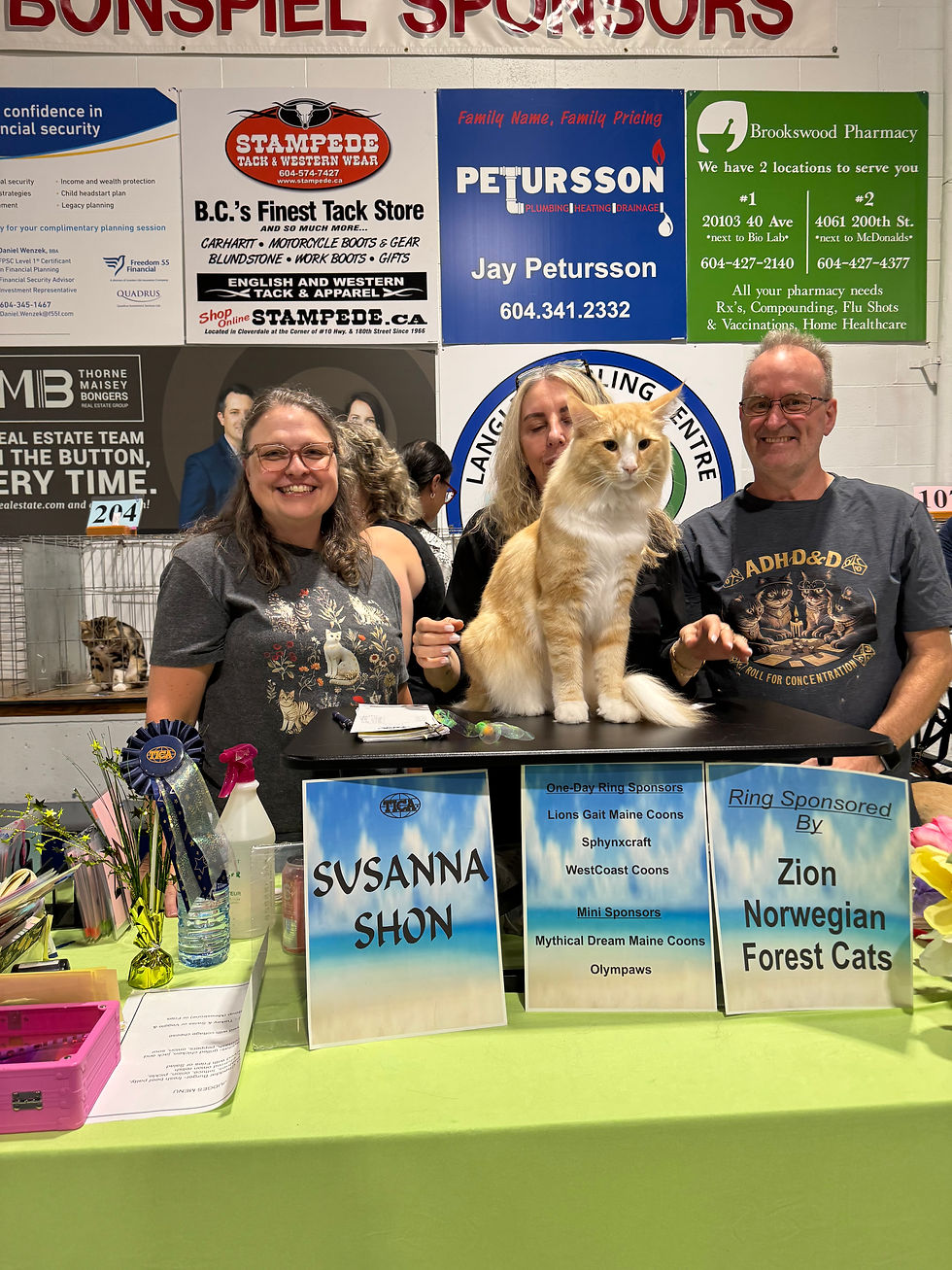Becoming a Cat Breeder: A Journey of Humility, Mentorship, and Lifelong Learning
- tarajohnson607
- Jul 13, 2025
- 4 min read
Updated: Jul 13, 2025

The Humble Journey of Becoming a Dedicated Cat Breeder
Embarking on the journey of becoming a cat breeder is both exciting and profoundly humbling. It involves more than simply pairing cats and raising kittens; it requires a commitment to the preservation, protection, and enhancement of a breed you come to cherish deeply. This path demands a teachable, humble mindset—one that is open to listening, learning, and evolving.
Our cattery is now in its third year, and we are immensely grateful for the mentors, friends, and fellow breeders worldwide who have supported and guided us. As we are still in our early years, we recognize that there is much to learn. We heavily rely on the wisdom of our mentors and seize every opportunity to grow—whether through educational programs like the PawPeds G1–G3 courses (we are currently awaiting G2), attending online seminars, or engaging with reputable, science-based content to ensure our decisions are informed and thoughtful.

Mentors: Key to Success for New Breeders
One of the most essential steps for any new breeder is identifying suitable mentors. These individuals should not only possess extensive breeding experience but also demonstrate adaptability, encouraging you to make informed and thoughtful decisions, even if those decisions differ from their own. It is essential for a breeding mentor to have undergone mentorship themselves. They should possess expertise in pedigrees and genetics, particularly concerning color, health, conformation, and notably, animal husbandry. I find it fascinating to learn about the history of our breed and the breeders in Europe and the USA who have nurtured the Norwegian Forest Cat through the years. A relatively inexperienced breeder can still possess a keen eye and make sound decisions for their own cattery. However, we may not yet have sufficient experience to provide comprehensive advice to others in all aspects of animal husbandry.
A mentor will inspire you to improve and think innovatively. Whether it involves selecting a mating pair or determining a dietary plan, a competent mentor will provide candid feedback while respecting your autonomy, as long as your decisions are ethical, health-oriented, and prioritize the well-being of your cats. Breeding does not adhere to a one-size-fits-all approach, and there is value in embracing variation and adaptation within the principles of good husbandry and breed standards. Not all mentors are suitable for every situation, and not every breeder is equipped to serve as a mentor, much like not everyone is suited to teach in a classroom. It may not be their strength. If you encounter such a situation, it is advisable to exit the relationship gracefully and seek recommendations from colleagues, even those specializing in other breeds.
How can you find a mentor? I was connected with a mentor through the breed registry CFA. I was introduced to a long-time breeder in California and then connected with a new breeder like myself in the Pacific Northwest. He helped me get started at cat shows. From there, I began networking and building connections at cat shows and through online groups. I feel fortunate to have so many knowledgeable and reputable individuals in the cat fancy to guide and redirect me.

The Journey of Ethical Breeding: Embracing Mistakes and Prioritizing Growth
"Safe" mistakes—those that do not compromise animal welfare—are acceptable and even essential as part of the learning process. No one learns without trial, error, and adjustment. If your intentions are to protect, preserve, and enhance your breed, these lessons contribute to your development as a breeder.
It is also important to recognize that breeding in an ethical and effective manner requires time. It is neither a quick nor easy undertaking. Each litter provides new insights, each show offers greater understanding, and each unexpected outcome encourages you to become more thoughtful and intentional.
A responsible breeder prioritizes health, temperament, and conformation. This involves importing or carefully selecting breed-standard sires and queens who have passed health testing. It requires the courage to adapt when things do not go as planned—when a pairing fails to produce the desired traits, or when unexpected conformation faults or health issues arise. An experienced mentor, capable of meticulously analyzing a pedigree, is essential in this context.Protecting your cats and your breed sometimes necessitates difficult decisions, but these decisions should always be made with clarity, compassion, and a long-term vision.

Embracing Responsibility and Growth in Cat Breeding
As breeders, we serve as custodians of our chosen breed. The decisions we make today will shape its future. This responsibility requires humility, integrity, adaptability, and a steadfast commitment to continuous learning.
Fundamentally, successful breeding prioritizes the wellbeing of the cats. Every decision—whether it involves pairing, placement, or adjustments—must prioritize their best interests.
If you are embarking on this journey, remain humble and open to learning. Surround yourself with knowledgeable and supportive mentors. Do not fear mistakes; instead, reflect on your decisions. Were they safe? Were they informed and made with care? Consider what you have learned and how you can improve in the future. This path will challenge you, but it will also lead to unexpected personal growth.







Discover the joy of a heartwarming home with our Siberian kittens for sale, known for their hypoallergenic fur and affectionate nature. Imagine coming home to a companion who brings happiness and fits your lifestyle, even with allergies. Each kitten link is a unique masterpiece, offering a blend of adventurous spirit and serene companionship. These delightful felines are ready to be part of your family, sharing life's moments and providing comfort. Elevate your life with a Siberian cat—the jewel of the feline world.
Beautifully written, well said, and kudos to my fellow breeder Tara, who has come such a long way in her breeding practice, and in such a short time with a great team and excellent cats. I look forward to many shared breedings and helpful convos!
Gudrun of GudrunSplace Norwegian Forest Cats.